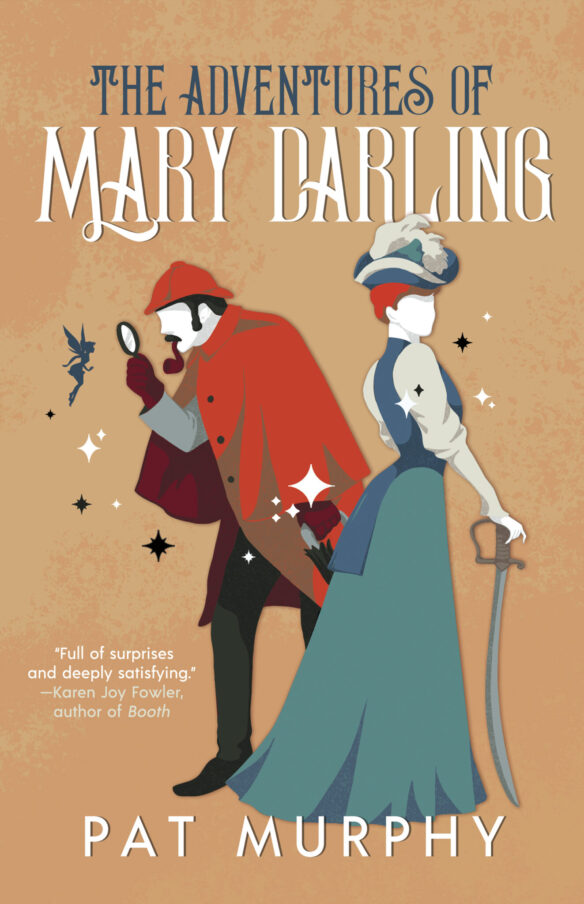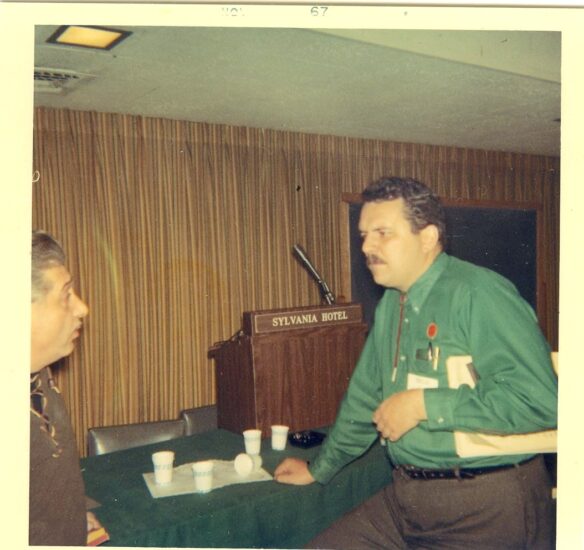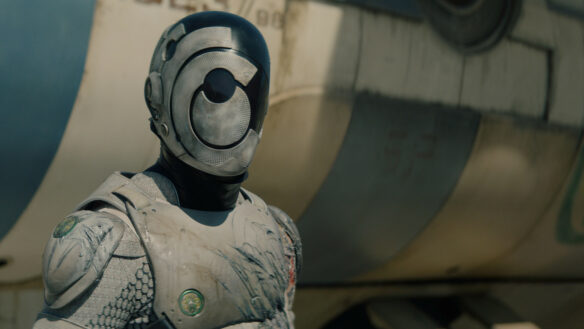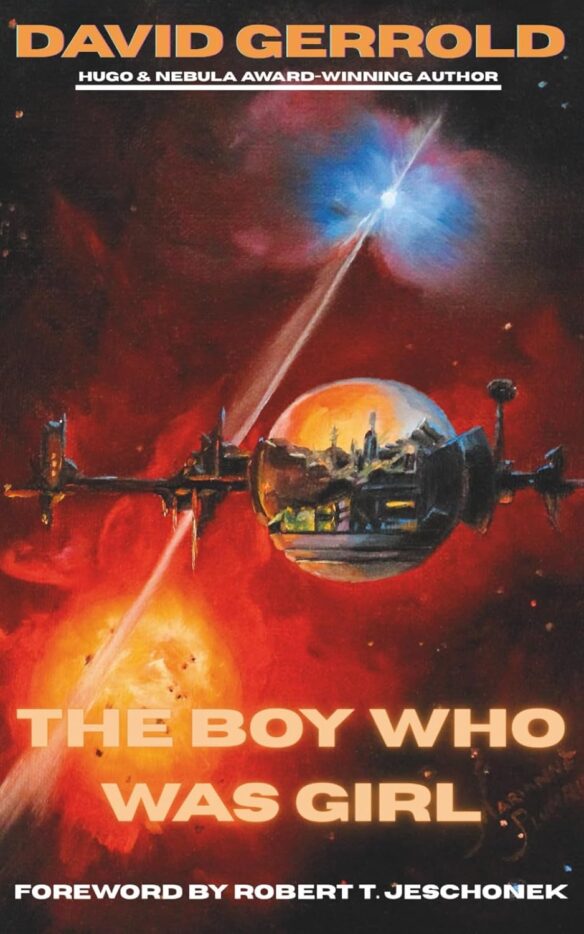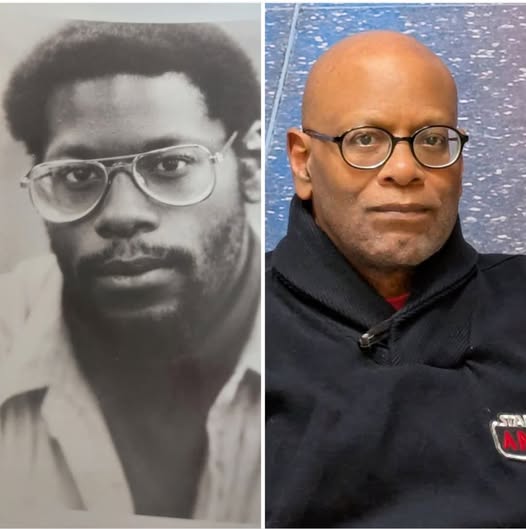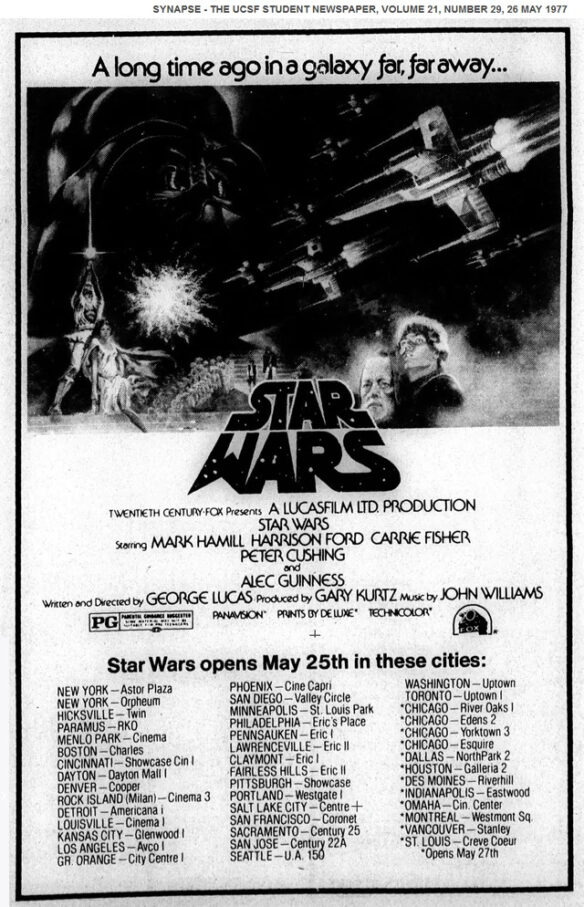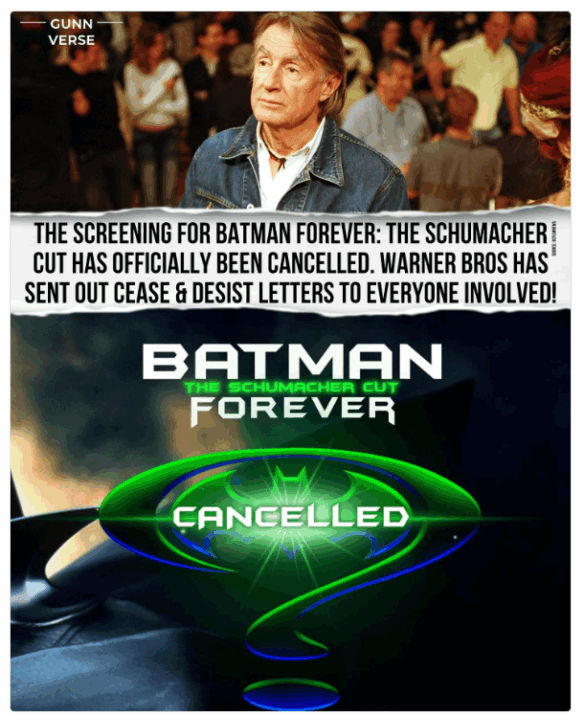(1) MASSIVE SPOILER WARNING. And don’t read the URLs of these two links, either, which also contain the spoiler.
Gizmodo asks “What the Hell Just Happened on ‘Doctor Who’?” – and then answers the question. No spoiler in the first paragraph, fortunately.
Doctor Who‘s latest season has just come to an end—and with it, we just got hit with an absolute shocker of a cliffhanger. Let’s discuss, shall we?
The Guardian’s storygoes even farther with a spoileriffic headline that I won’t quote fully: “Doctor Who finale sees…”
(2) LOCUS APPEAL NEARS END. The “Locus Mag 2025” fundraiser at Indiegogo ends today. With seven hours still to run it had taken in $80,375. How much does that help?
…With rising inflation, tariffs, and shipping costs, it now costs over $725,000 a year to publish the magazine, run the website, and present the awards each year. Through subscriptions, advertising, and existing donations and sponsors, we can count on $400,000 in anticipated revenue next year. That means we need to raise an additional $325,000 to make it all the way through 2025….
So there are probably more fundraising efforts to come.
(3) THE 20,000 LEAGUE MISSION. “Star Trek Alum Shazad Latif Captains the ‘Nautilus’ in First Trailer for Rescued Sci-Fi Series” – Collider profiles the show.
Star Trek: Discovery‘s Shazad Latif is going where no man has gone before… but this time, instead of outer space, he’s headed to the hidden depths of the ocean. Latif stars as Captain Nemo in Nautilus, AMC’s new reimagining of Jules Verne‘s classic science fiction novel 20,000 Leagues Under the Sea. The show’s new trailer sees him set sail in the titular super-submarine, even as he’s pursued to the ends of the Earth. The series premieres June 29 on AMC and AMC+.
In the new trailer for the 19th-century-set science fiction series, which serves as a prequel to Verne’s novel, Nemo is the prisoner of the East India Mercantile Company, a globe-spanning corporation that wields more power than any government. He and his fellow prisoners are put to work building the Nautilus, an advanced submarine that the Company hopes will further tighten its grip on the world’s seaways. However, Nemo foments a rebellion among his fellow prisoners and takes command of the ship, escaping into the depths with his fellow prisoners as his crew. The Mercantile Company is soon in hot pursuit, with a dogged mariner assigned to bring Nemo down; meanwhile, Nemo has an unwilling passenger on board. Will he have his revenge on his captors, or will the Company deep-six his ambitions?…
(4) NYT’S PETER DAVID TRIBUTE. The New York Times profile is terrific — “Peter David, Comic Book Writer Who Repopularized the Hulk, Dies at 68” – but paywalled. Here’s the very end of the piece:
…Mr. David, a gregarious soul who was befriended by movie stars and celebrities in the science-fiction realm, fondly remembered in his memoir the night he was watching the original “Star Wars” movie on television and its protagonist, Mark Hamill, called. A budding comic book writer himself, Mr. Hamill wanted to know: Could Mr. David write the introduction to a collection of his work?
“Uh, hey, Mark,” Mr. David said. “I’m watching you about to blow up the Death Star.”
“I can call back,” Mr. Hamill replied.
“No, that’s OK,” Mr. David told him. “I’ve seen this movie before. I know how it ends.”
(5) QUACKING UP. Scott Edelman is back with Episode 23 of the Why Not Say What Happened? podcast: “Why Howard the Duck Was the Silver Surfer of the ’70s”. (And here’s several dozen platforms where it can be found.)
Join me and Neil Ottenstein for a rambling panel about Howard the Duck in which I share the Marvel Comics chaos which caused me to be hired there in 1974, my regrets over having written an issue of Omega the Unknown, my ethical queasiness about owning original art, what it means when I say I knew Stan Lee before he had hair, my terrifying Bullpen encounters with “Jumbo” John Verpoorten, why Howard the Duck was the Silver Surfer of the ’70s, my Times Square street theater with Steve Gerber, the time Howard the Duck had to be hatched instead of laid, how immaturity cost me Captain Marvel, the only time I ever saw Stan Lee get flustered, and more.
Among other things, Edelman recalls the time Howard the Duck couldn’t get laid – see the relevant comics panel here, and read the whole story here.
(6) HOW WUDE! [Item by Steven French.] Ben Child, in the Guardian’s “Week in Geek”, ponders a galaxy full of hangovers rather than hope: “Ryan Reynolds has pitched an ‘R-rated’ Star Wars. What would that look like?”
Take all the essential ingredients of Star Wars – samurais in space, adventure among the wookiees, aliens with backward syntax, evil cyborgs with a penchant for murder by telekinesis – then imagine George Lucas hadn’t given us all of that through a PG prism. This, it appears, is what Ryan Reynolds did when pitching to Disney. “I said, ‘Why don’t we do an R-rated Star Wars property?’” Reynolds told The Box Office podcast. “‘It doesn’t have to be overt, A+ characters. There’s a wide range of characters you could use.’ And I don’t mean R-rated to be vulgar. R-rated as a Trojan horse for emotion. I always wonder why studios don’t want to just gamble on something like that.”
Let’s imagine the scene: a gaggle of studio execs are nervously cowering before the Hollywood A-lister’s megawatt smirk as he reveals his idea for a take on George Lucas’s space opera that doesn’t hold back. This is Star Wars Tarantino-style. Perhaps Mando’s got a drug problem, or Chewie really does rip people’s arms off – and beat them to death with the wet ends. Somewhere over in Coruscant a Jedi slices a corrupt senator into symmetrical chunks without ever unsheathing his saber. Or maybe Reynolds just thinks the galaxy far, far away could use a little more Deadpool & Wolverine-style sweary irreverence.
He’s wrong. Push Star Wars too far into the realm of self-aware snark, or nudge it to start laughing at itself before the audience does, and you undercut the very thing that keeps fans tethered to its dusty, big-hearted mythos. We already have umpteen animated takedowns – Robot Chicken’s fever-dream dismemberments, Family Guy’s fart-laced remakes – and they’re fine, in their way. But if Star Wars ever starts mimicking the shows that exist solely to mock it, then the circle will be complete….
(7) THE THING OF SHAPES TO COME. Rich Horton’s reviews of the finalists continue at Strange at Ecbatan: “Hugo Ballot Review: Someone You Can Build a Nest In, by John Wiswell”.
… The story is told from the point of view of Shesheshen, who is a shapeshifting monster, or wyrm, and who has threatened the population of the Isthmus for some time. As the novel opens, Shesheshen is awakened early from her yearly hibernation by a familiar menace — monster hunters….
(8) CONCURRENT SEATTLE. ConCurrent Seattle, a one-day alternate program created in protest of the use of ChatGPT by the Seattle Worldcon, had raised almost half of its $5,000 budget as of yesterday.
The use of ChatGPT at WorldCon has been a breach of trust in an industry of writers whose work has been stolen to train genAI. ConCurrent, a one-day event being held on Thursday, August 14, 2025, at the ACT Theatre in downtown Seattle, is an alternative for those who want a convention with no genAI involved.
ConCurrent is not a replacement for WorldCon and will be free of charge and open to all….


(9) JAYANT NARLIKAR (1938-2025). [Item by Steven French.] The science journal Nature has an obituary of Jayant Narlikar who was not only Fred Hoyle’s PhD student and collaborator (together they developed an alternative theory of gravitation which rejected any Big Bang) but also wrote science fiction himself (his novel The Comet is still on the syllabus in some Indian schools). “Jayant Narlikar, visionary astrophysicist and science populariser, dies at 86”. He died on May 20.
… Narlikar’s influence extended well beyond academic circles. He was a dedicated science communicator and one of India’s earliest and most prolific writers of science fiction. A story exploring black holes and time dilation, submitted anonymously, won him his first award and launched a writing career that brought scientific ideas to a wider audience. His accessible and engaging popular science books became fixtures in school curricula and earned him the UNESCO Kalinga Prize in 1996….
(10) MEMORY LANE.
[Written by Paul Weimer.]
May 31, 1990 — Total Recall
By Paul Weimer: “Get your ass to Mars”.
Sure, I think as social satire The Running Man is probably better science fiction as a movie. But as a vehicle for 1980’s SF for Schwarzenegger that wasn’t Terminator, I think you can’t do better than one of my favorites, Total Recall. The excitement of a movie “based on a story by Philip K. Dick” (which I subsequently read and was confused by how little it actually had to do with it.)
But the movie is a corker from start to finish and so much of the movie is imprinted in my brain to this day. The movie’s insistence on keeping it very ambiguous, right to the end, if Quaid was dreaming or not , charmed me. I argued with my brother over this, who thought the “sweat drop” scene with Dr. Edgemar proved it was all real. I disagreed, and pointed out things like “Bluesky on Mars” being the name of his program, and how Melina resembled the woman programmed for his vacation. And if you listen to the commentary, Paul Verhoeven directed the movie with the point of view that it was all a dream, and Schwarzenegger acted with the point of view that it was reality. It makes for an interesting tension on screen and it works.
There are lots of little details that happen in the background. The change in geopolitical setup to a North-South Cold War. The Tokyo Samurai are trying to go for a fifth and deciding win in the World Series (so now the American Baseball leagues have teams in Japan…and the World Series is a best of nine affair). The movie is visually rich and generous like that, showing a lived in world that you can believe is real. Two worlds to be precise, both Earth and Mars. And the brutalist architecture pattern works for this authoritarian future.
And of course the movie is hideously violent. The body count is high.
The movie remains ever relevant with its critiques of colonialism, and authoritarianism. We are meant to side with the Free Mars movement, and maybe not until Cox’s Cohagen decides to kill everyone by asphyxiation does he really go from a tyrannical colonial figure who is vaguely understandable, to a true and undeniable monster that is irredeemable. But that steady revelation of just how horrible he can be starts with him looking sympathetic at first, and then unfurling his true nature and the extent of what he has done, and is willing to do. It’s a dive into authoritarian and colonialist mindsets, and in this day and age, even more relevant than ever.
And the movie follows through on the implications of its technology with the character beats. When Richter is told that Quaid/Hauser won’t remember anything, he just has to punch him hard, because of all what he’s put Richter through at this point. It’s a character beat that makes sense given the tech. And we have Chekov’s guns all over the place, which all fire, which propel us to the final confrontation. Sure, the “Ten second terraforming method of Mars” is bonkers and would not work. The movie doesn’t explain that there are more steps to the breathable atmosphere than melting the ice to get oxygen. I don’t care.
I read the novelization, done by Piers Anthony, because “I wanted to know more”. And I wish I hadn’t. I had not yet discovered how terrible Anthony was as a writer, but the novel’s insistence at each and every chance to say “yes this is real” over and over, was disappointing. Even at the end, when Quaid points out to Melina that she looks like the woman from Rekall, she casually says she used to do modeling for them. The book was determined to squash any ambiguity, and it was a major turn off. It did more solidly explain the terraforming, though and how it would work.
But the movie remains solid. Don’t bother with the remake. Watch the original. Don’t let me down, buddy, I’m counting on you.

(11) COMICS SECTION.
- Brilliant Mind of Edison Lee compares entertainments.
- Wumo avoids a clichéd location.
- xkcd says this is not an immediate concern.
(12) MURDERBOT SUITS UP. Alexander Skarsgård shows it’s a real challenge to pull on his costume in this TikTok video: “Discover the Morning Routines of Security Units in Murderbot”.
(13) TODAY’S THING TO WORRY ABOUT. “How the iPhone Drove Men and Women Apart” is a hooky headline, but the real topic of Ross Douthat’s Interesting Times podcast (which is the source of the New York Times article) is the declining fertility rate in many countries. If the NYT article is paywalled, the podcast episode is available on YouTube under the title “Progressives Are Driving Themselves Into Extinction”.
…Douthat: What about culture apart from politics? Because, while it is the case that culture is determined to some degree by tech, the smartphone creates culture in its own way. It’s also the case that the issue of declining birthrates is not one that much of elite Western culture has taken seriously. It’s not something that’s entered into the mainstream cultural mind the way that the threat of climate change has done. So you could imagine if it became a more important part of the cultural imaginary — some kind of self-conscious attempt to treat this as an important issue.
Let’s say, right now people in Hollywood would feel bad if they were perceived to be not doing something to fight climate change or something. Hollywood used to make a lot of romantic comedies. It doesn’t really anymore. There’s still a few. But are there cultural scripts that could be written — whether in movies or TV or elsewhere — that you think could actually make a difference?
Evans: I think definitely, yes. And I think it would be wonderful if Hollywood promoted that and supported that. In fact, as a joke last year, I even wrote a comedy script about how Hollywood could support fertility and things like that.
Even though I’m totally on board with that — and I think that’s very important — there are several frictions. One, it’s very difficult to do cultural engineering today, because we have infinite options of entertainment at our fingertips — on Netflix and everything. So if you’re not that interested in a romantic comedy — you know, in China, a lot of the most popular films are about divorce. So it’s difficult to do cultural engineering. On top of that, as long as people are hooked on their smartphones, they might not have the social skills to do it.
I think another possible mechanism would be to use the tax system and to give massive tax incentives to people who have children, because that’s a positive externality….
(14) NUMBER NINE? NUMBER NINE? “Scientists Say They’ve Found a Dwarf Planet Very Far From the Sun” – this link bypasses the New York Times paywall. “The small world was found during a search for the hypothetical Planet Nine, and astronomers say the next time it will reach its closest point to the sun is in the year 26186.”
A sizable world has been found in a part of the solar system that astronomers once thought to be empty. It probably qualifies as a dwarf planet, the same classification as Pluto.
Temporarily named 2017 OF201, it takes more than 24,000 years to travel around the sun just once along a highly elliptical orbit, coming as close as 4.2 billion miles and moving as far out as 151 billion miles. (Neptune is just 2.8 billion miles from the sun.)
And 2017 OF201 may have implications for the hypothesis of an undiscovered planet, nicknamed Planet Nine, in the outer reaches of the solar system.
“We discovered a very large trans-Neptunian object in a very exotic orbit,” said Sihao Cheng, a researcher at the Institute for Advanced Study in Princeton, N.J….
(15) WHAT’S THAT SMELL? [Item by Steven French.]
“My space-dog has no nose!”
“How does he smell?”
“Like a poisonous marzipan cloud!”
“From cat urine to gunpowder: Exploring the peculiar smells of outer space” at the BBC.
Scientists are analysing the smells of space – from Earth’s nearest neighbours to planets hundreds of light years away – to learn about the make-up of the Universe.
Jupiter, says Marina Barcenilla, is “a bit like a stink bomb”.
The largest planet in the solar system, Jupiter has several layers of cloud, she explains, and each layer has a different chemical composition. The gas giant might tempt you in with the sweet aroma of its “poisonous marzipan clouds”, she says. Then the smell “would only get worse as you go deeper”.
“You would probably wish you were dead before you got to the point where you were crushed by the pressure,” she says.
“The top layer of cloud, we believe, is made of ammonia ice,” says Barcenilla, likening the stench to that of cat urine.” Then, as you get further down, you encounter ammonium sulphide. That’s when you have ammonia and sulphur together – a combination made in hell.” Sulphurous compounds are famously responsible for stinking of rotting eggs….
(16) RARA AVIS. [Item by SF Concatenation’s Jonathan Cowie.] Eat chicken — I have never really forgiven the dinosaurs for what they did to Raquel Welch. This is this week’s Nature cover story….
The cover shows an artist’s impression of Archaeopteryx, the oldest-known fossil bird, which lived some 150 million years ago. In this week’s issue, Jingmai O’Connor and colleagues describe the fourteenth known specimen of Archaeopteryx — colloquially known as the Chicago Archaeopteryx because it was acquired by the Field Museum of Natural History in Chicago, Illinois. This specimen is important because it is so well preserved: it is nearly complete and has not been crushed, which means it retains a remarkable level of detail. This, combined with painstaking preparation guided by micro-computed tomography, allowed the researchers to uncover fresh information about the skeleton, soft tissues and plumage of this iconic creature. Among the team’s findings are specialized inner secondary feathers called tertials on both wings, and an indication that creature’s foot pads were adapted for movement on the ground. The collection of newly identified features suggests that Archaeopteryx was adapted for some level of flight and was comfortable living both on the ground and in trees.

[Thanks to Andrew Porter, John King Tarpinian, Chris Barkley, Scott Edelman, Cat Eldridge, SF Concatenation’s Jonathan Cowie, Mark Roth-Whitworth, Steven French, Kathy Sullivan, Teddy Harvia, Mike Kennedy for some of these stories. Title credit belongs to File 770 contributing editor of the day Daniel Dern.]

